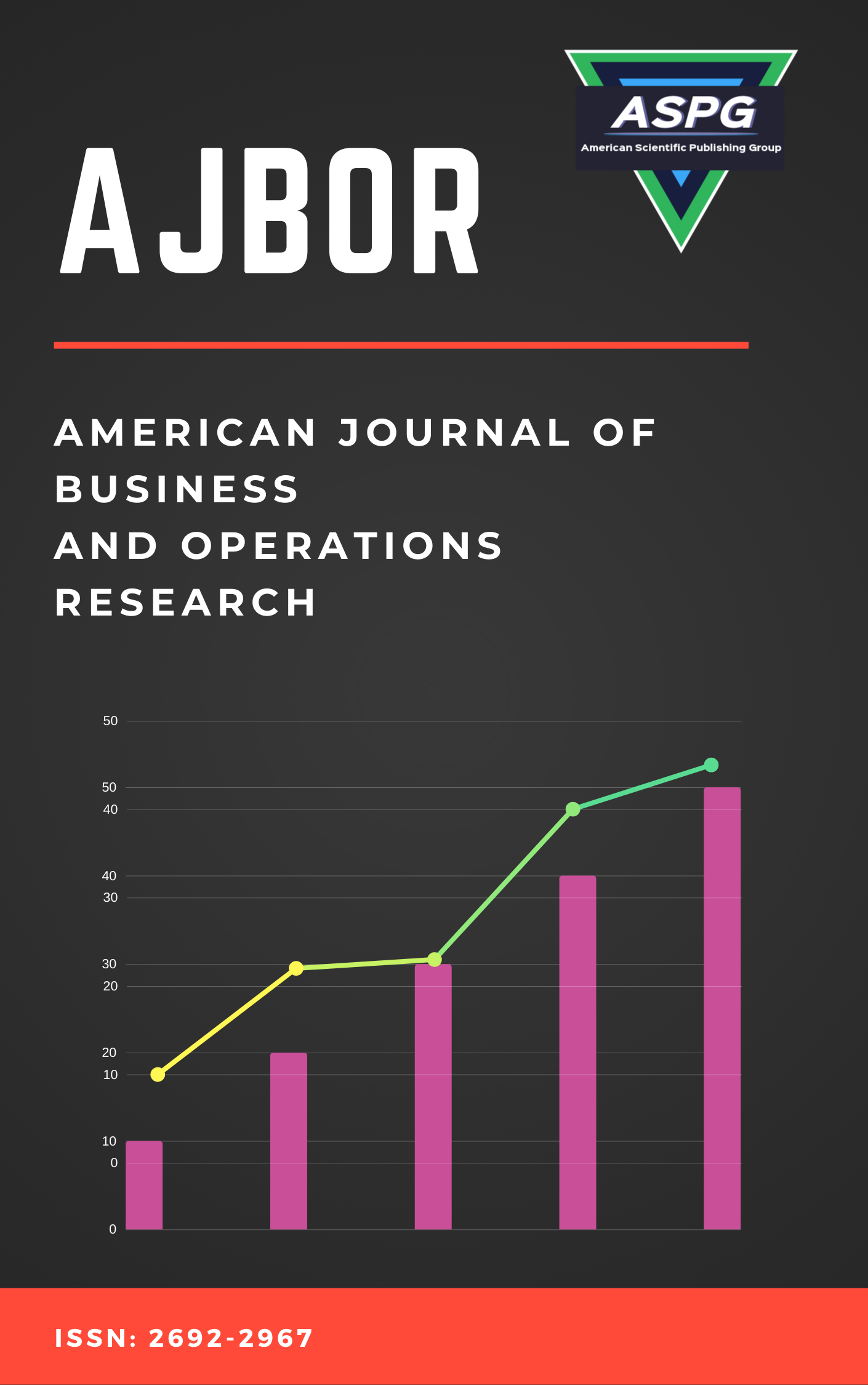

Volume 2 , Issue 1 , PP: 24-38, 2021 | Cite this article as | XML | Html | PDF | Full Length Article
Amal F.Abd El-Gawad 1 * , Shereen Zaki 2 , Esraa Kamal 3
Doi: https://doi.org/10.54216/AJBOR.020103
Machine learning arose from the increasing ability of machines to handle large amounts of data over the last two decades, and some machines could also identify hidden patterns and complicated associations that humans couldn't, allowing them to make rational and precise decisions, especially for disruptive and discontinuous data. In several areas of decision-making, machines could produce more reliable outcomes than humans and have already begun to replace them. Machine learning, which is widely recognized as a breakthrough technology, has recently made significant progress in improving supply chain management processes and efficiency. From planning to delivery, machine learning may be applied at different stages of the supply chain management process. Machine learning types are supervised, unsupervised, reinforcement. Each type has many tools which are discussed below in detail. This paper presents a detailed survey on machine learning techniques for supply chain management including supply chain and supply chain management interpretation, machine learning definition, its types, and some algorithms that belong to it.
Machine learning, Supply chain management, Supervised learning, Unsupervised learning, Reinforcement , learning
1. Ni, Du, Zhi Xiao, and Ming K. Lim. "A systematic review of the research trends of machine learning in supply chain management." International Journal of Machine Learning and Cybernetics (2019): 1-20.
2. Hoppe, Magnus Tilmar. Machine learning in supply chain management. Diss. 2019.
3. Wenzel, Hannah, Daniel Smit, and Saskia Sardesai. "A literature review on machine learning in supply chain management." Artificial Intelligence and Digital Transformation in Supply Chain Management: Innovative Approaches for Supply Chains. Proceedings of the Hamburg International Conference of Logistics (HICL), Vol. 27. Berlin: epubli GmbH, 2019.
4. Makkar, Sandhya, G. Naga Rama Devi, and Vijender Kumar Solanki. "Applications of machine learning techniques in supply chain optimization." International Conference on Intelligent Computing and Communication Technologies. Springer, Singapore, 2019.
5. Agarwal, Anshul & Jayant, Arvind. (2019). Application of Machine Learning Techniques in Supply Chain Management. 10. 2348-9367.
6. Xiao R, Li J, Chen T (2019) Modeling and intelligent optimization of social collective behavior with online public opinion synchronization. Int J Mach Learn Cybern 10(8):1979–1996
7. Mishra N, Singh A (2018) Use of twitter data for waste minimisation in beef supply chain. Ann Oper Res 270(1–2):337–359.
8. Javaregowda, Madhuri & B, praveen & Kumar, Pradyumna & J, Prateek & G, Pragathi. (2020). Inventory management using Machine Learning. International Journal of Engineering and Technical Research. 9.
9. Lolli, Francesco & Balugani, Elia & Ishizaka, Alessio & Gamberini, Rita & Rimini, Bianca & Regattieri, Alberto. (2019). Machine learning for multi-criteria inventory classification applied to intermittent demand. Production Planning and Control. 30. 76-89. 10.1080/09537287.2018.1525506.
10. Praveen, Umamaheswaran, Ganjeizadeh Farnaz, and Ghasib Hatim. "Inventory management and cost reduction of supply chain processes using AI based time-series forecasting and ANN modeling." Procedia Manufacturing 38 (2019): 256-263.
11. Ovsyannikova, Alexandra, and Jenny Domashova. "Identification of public procurement contracts with a high risk of non-performance based on neural networks." Procedia Computer Science 169 (2020): 795-799.
12. Liu, Li, and Wenxue Ran. "Research on supply chain partner selection method based on BP neural network." Neural Computing and Applications 32.6 (2020): 1543-1553.
13. Abdulla, Ahmad & Baryannis, George & Badi, Ibrahim. (2019). Weighting the Key Features Affecting Supplier Selection using Machine Learning Techniques. 10.20944/preprints201912.0154.v1.
14. Yang, Ying. "Research on the optimization of the supplier intelligent management system for cross-border e-commerce platforms based on machine learning." Information Systems and e-Business Management 18.4 (2020): 851-870.
15. Antipov, Evgeny A., and Elena B. Pokryshevskaya. "Interpretable machine learning for demand modeling with high-dimensional data using Gradient Boosting Machines and Shapley values." Journal of Revenue and Pricing Management (2020): 1-10.
16. Pavlyshenko, Bohdan M. "Machine-learning models for sales time series forecasting." Data 4.1 (2019): 15.
17. Seyedan, Mahya, and Fereshteh Mafakheri. "Predictive big data analytics for supply chain demand forecasting: methods, applications, and research opportunities." Journal of Big Data 7.1 (2020): 1-22.
18. Sabbeh, Sahar F. "Machine-learning techniques for customer retention: A comparative study." International Journal of advanced computer Science and applications 9.2 (2018).
19. Tizghadam, Ali, et al. "Machine learning in transportation." (2019).
20. Amiri, Shideh Shams, et al. "Machine learning approaches for predicting household transportation energy use." City and Environment Interactions 7 (2020): 100044.
21. Huovila, Emmi. "Use of machine learning in supply chain management: case study with DataRobot." (2021).
22. Sarker, Iqbal H. "Machine learning: Algorithms, real-world applications and research directions." SN Computer Science 2.3 (2021): 1-21.
23. Xu, Yayin, et al. "Machine learning in construction: From shallow to deep learning." Developments in the Built Environment (2021): 100045.
24. Sharma, Neha, Reecha Sharma, and Neeru Jindal. "Machine Learning and Deep Learning Applications-Af Vision." Global Transitions Proceedings (2021).
25. Baryannis, George, Samir Dani, and Grigoris Antoniou. "Predicting supply chain risks using machine learning: The trade-off between performance and interpretability." Future Generation Computer Systems 101 (2019): 993-1004.
26. Wieland, Andreas. "Dancing the supply chain: Toward transformative supply chain management." Journal of Supply Chain Management 57.1 (2021): 58-73.
27. Feng X, Xiao Z, Zhong B, Qiu J, Dong Y (2018) Dynamic ensemble classifcation for credit scoring using soft probability. Appl Soft Comput 65:139–151.
28. Ma H, Wang Y, Wang K (2018) Automatic detection of false positive RFID readings using machine learning algorithms. Expert Syst Appl 91:442–451.
29. Singh A, Shukla N, Mishra N (2018) Social media data analytics to improve supply chain management in food industries. Trans Res Part E 114:398–415.